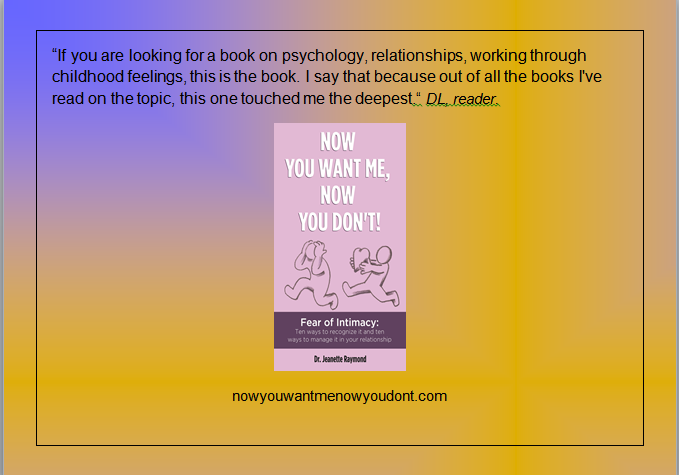Tips on Conquering The Fear of Emotional Intimacy
.jpg)
Thirty-four-year-old Justine loved her job as an EMT service person with her local Fire Department. She enjoyed the excitement of rushing to save people in car accidents or from overdosing alone at home. But when it came time to go home and be a wife and mother, she got anxious and stressed.
Would her two year old daughter Tricia run to her or be upset that her mom had been away so long and cling to the nanny instead? Could she trust her thirty-seven-year-old husband Andre, a policeman to remember to bring home the pet food for their three dogs? Was he going to take the dogs for a walk tonight so she could have some quality time with Tricia?
Anticipating being let down by your partner creates anxiety and whips up a fear of emotional intimacy
Anxiety rose to overflowing proportions as Justine pulled up to the garage, waiting for door to open. Her head started pounding and her breath became shallow. Her eyes scanned the house to make sure everything was okay, while that voice in her head kept speaking about her fury and disappointment that Andre just didn’t seem to care about how stressed and overloaded she was. It was just liked she felt growing up as a young girl, coming home from school and finding her mother out, no food prepared and dogs that had messed inside because they hadn’t been walked during the day!

As Andre got ready to switch his squad car for his own and head on home, his mind went to what he would be expected to do when he arrived. What would Tricia pick on to castigate him about tonight, and how could he communicate that he was doing a ton of things that she didn’t see? Feeling invisible in what he did, he was spotlighted for what he didn’t do, and nothing seemed to alter that pattern. That was how he used to feel on his way home from school as a young teen. Instead of complimenting him for his excellent school grades, he was lambasted by his overworked mother for not tidying his bedroom and clearing up the breakfast dishes earlier that day.
Filled with a mix of resentment and a need to defend what he expected would be an onslaught of accusations, Andre entered the house and went straight to pick up Tricia and give her a hug. Feeling ignored, Justine went ballistic. How could he put her in second place? She was his wife, yet she meant so little.
.jpg)
Attempting to apologize and placate Justine didn’t help at all. She was incensed that no amount of repentance seemed to soften her tone. He was the embodiment of both her negligent parents and she wasn’t going to be convinced otherwise. Furious and scared that he wasn’t able to persuade his wife of his ‘goodness’, Andre took the dogs out, hoping she would feel his loss and welcome him back in a more contrite fashion.
As they got ready for bed that night, Andre wanted to get close and feel welcomed back into Justine’s life. But she made sure to keep him out. She complained about the light on his night stand and the fact that she needed to be up at 5:00 am, telling him to use the guest room.
Three days later, Justine called Andre as she was driving home from a tough day at work. She had seen a woman bleed out on the road, unable to save her from a crushing vehicular hit and run. She wanted him to put his arms around her and comfort her, while she cried and wound down from the horror of what she had witnessed. But when she got home, Andre was cold and distant. He had prepared the dinner, this being his short working day, going through the motions of asking her stuff. Justine wished she could run away and find another person to comfort her, while simultaneously wanting to throw the dinner at Andre for not being what she needed at that moment.

Retaliation and punishment substitute for closeness and warmth
When Justine needs Andre he isn’t available, and when Andre needs Justine she isn’t available – impasse. Each one is longing to be wanted be close, but just at the moment it is most needed, the door gets slammed. Retaliation is the driving force, and the desire for emotional intimacy gets snuffed out.
This is a classic example of both partners being afraid of emotional intimacy. Despite their longing the fear trumps and they just keep shutting one and other out.
Fear of emotional intimacy
· makes you put the walls up even if you deprive yourself of something you desire.
· Makes you choose the safety of being shut in while keeping the other out.
· Makes you feel strong because you are punishing your loved one
BUT fear of emotional intimacy also
· Keeps you isolated, alone and suspicious
· Keeps you feeling martyred in your goodness, making your partner ‘bad.’
· Keeps the old story going about your partner being mean and cold- reinforcing it in a way that leaves no room for trust, safety and connection.
· Keeps you from knocking a hole in the wall and trying something new and rewarding.

Breaking down the walls involve going down the bumpy road of relating hand-in-hand by:
1. Speak your fears of being ignored and let down. It doesn't have to be a criticism of your partner, but offering a window into the lens of fear through which you exist in the relationship.
Benefits: you and your partner will realize that you are both afraid of each others disapproval. Once you see that you are in the same boat, you can begin to dispel the anxieties and avoid that default place of anticipating the negative response.
2. Tell your partner how you feel about your relationship when you are disappointed. For example, that you want to teach them a lesson, or that you want them to feel your pain. That stops the cycle of revenge and punishment because you can call each other out on it.
Benefits: you recover quicker from that place of hurt, and get wise to the ploys used by your partner to get you to come to you and beg for you to return to the relationship.
Listen to my interview with Dr. Gordon Atherley to get tips on how to break down those walls.

Copyright, Jeanette Raymond, Ph.D.
Read excerpts of the book here
.jpg)





.jpg)
.jpg)
.jpg)
.jpg)
.jpg)
.jpg)

.jpg)



.jpg)
.jpg)
.jpg)





